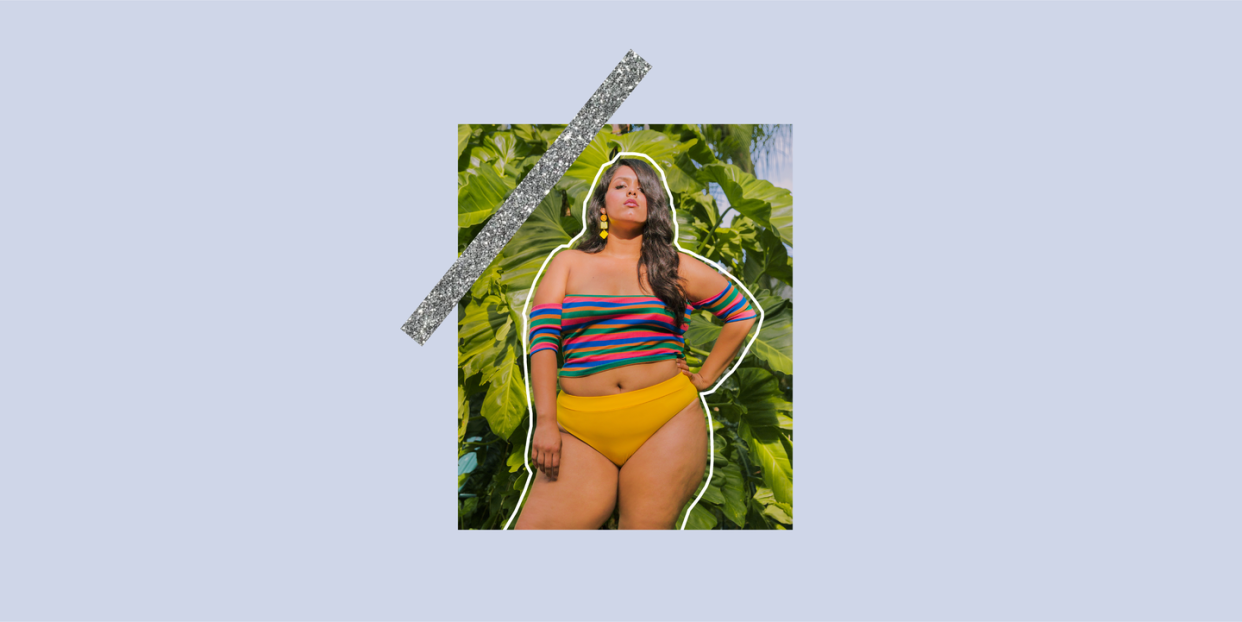"I shouldn't be excluded from sustainable fashion just because I’m plus-size"

Trying to find a vaguely cool outfit on the great British high street for a size 18 plus is hard enough, let alone finding one that is also sustainable.
Every day it seems my Insta-feed is blowing up with another cool sustainable label to add to my radar. Yet, whenever I add something to my cart, it’s a 'size 12 and below' kind of world out there. Frustrated doesn’t even begin to cut it.
The average size of women in the UK is a 16 (according to Fashion United) so it's mind-blowing that many labels still don’t cater to the £52 billion dollar plus-size market. Brands like ASOS Curve, Mango Violeta and Christian Siriano show that the demand for trend-driven plus-size womenswear is high, with the latter tripling its business after extending the size range. But curve options that are actually good for the planet (and its people) are still extremely limited.
So why aren't there more options available?
A post shared by Christian Siriano (@csiriano) on Jun 9, 2020 at 9:54am PDT
Well, even if slow fashion brands want to offer extended sizes they are met with a few obstacles...
The reasons you might've heard before
It costs more. Firstly, sustainable production costs are already higher than non-sustainable ones, meaning additional expenses need to be kept to a minimum.
It's risky. Add to that the fact that many sustainable labels are privately-owned small businesses without the backing of major conglomerates. This means some brands are unable to take on as many financial risks - such as testing the market with a larger sized collection - because each season pays for the next.
Uncertainty about whether it will sell. Having worked with small fashion labels, I know that adding even one more size to a production line can be a 'gamble' for the designer, especially if it doesn't sell or isn’t picked up by buyers. So even if demand is high, the fact that many major retailers don’t cater to the plus-size market means that smaller brands can't always afford the punt.
That's not to say the market isn’t there, it just means it might be trickier for smaller labels to tap into it... which brings our attention to larger sustainable brands that already have the manpower and resources to produce extended size ranges.
What needs to change
Many of the industry juggernauts' existing customer bases (and profits) could grow even more if they just catered for larger sizes - it’s a win-win. So why don't they?
I mean, if a brand says it designs for every woman, why not put their money where their mouth is and show up for the plus-sized community? Because, hello! I am a customer and newsflash: I and millions of other woman want to shop sustainably.
Even if they do extend their sizing, we don't want them to mark-up the larger sizes by 30% to keep overheads low. Yes ‘fat tax’ is a real thing, and it makes us feel like sh*t. We are worth more than a bottom line.
It's worth noting that some eco-minded brands are leading the way to greater inclusivity, proving that curvy can be conscious and cool.
New Zealand brand Maggie Marilyn is one of the few contemporary labels that has extended its size range up to a 16. While it’s not an 18, it is a start. Marilyn has been at the forefront of the sustainable movement providing transparency of supply chain to packaging and even starting environmental initiatives.
A post shared by M A G G I E M A R I L Y N (@maggiemarilyn) on May 28, 2020 at 1:43am PDT
Similarly, ethical activewear brand Girlfriend Collective believes that "health and wellness come in many shapes and sizes." And their offering of 6XL sportswear has been a total game-changer. Love & Lemon's sustainability collection, which goes up to a size 18/20, proves that cult brands can also successfully incorporate extended sizing. See? It can definitely be done. We just need more brands that are willing to try it.
A post shared by Girlfriend Collective (@girlfriend) on Mar 13, 2020 at 10:58am PDT
So the aim is to change the conversation and make it heard that curvy women want to shop sustainably.
What you can do
Half the battle is getting designers and retailers to acknowledge that plus-size is a normal body type. Go into stores and email brands letting them know that you want your size in stock. Or, if it's a smaller label, see if they will custom make a piece for you. If we stay silent and don't speak up about what we want, how can we expect the industry to know that a whole new customer base is ready and waiting?
If you're a designer who wants to support plus-size, but are unable to add more sizes to your range straight away, try testing the water. Start by offering a small range of hero pieces for an exclusive, limited-edition collection and see how it works. Or, if you work with a limited stock, offer custom made one-off pieces to gauge how big the demand is for extended sizing.
The plus-size community is ready to welcome sustainable fashion into their closets with open arms, all the brands have to do is show up. Sustainable fashion can and should be inclusive - if that’s not incentive enough, I don’t know what is.
Follow Nathalie on Instagram.
Like this article? Sign up to our newsletter to get more articles like this delivered straight to your inbox.
You Might Also Like


